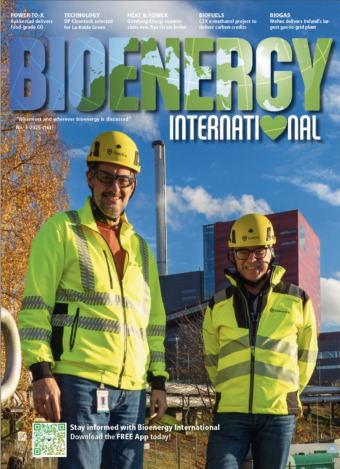In response to recent international regulatory developments, the International Biomass Torrefaction and Carbonisation Council (IBTC) has established a dedicated Working Group to address the impending challenges surrounding the maritime transportation of pyrogenic biocarbon.
The IBTC Working Group is tasked with navigating the complexities of maritime logistics and regulatory compliance in light of a significant amendment to the International Maritime Solid Bulk Cargoes (IMSBC) Code.
The Working Group focuses on production standards, transportation regulations, and is spearheading the effort to create a new IMSBC codification for Biocarbon within the framework of the International Maritime Organization (IMO).
In a critical regulatory shift, the IMO has issued an amendment to the IMSBC Code, classifying carbon of animal or vegetable origin as dangerous goods.
Coming into force on January 1, 2026, this amendment, IBTC says, poses a “direct threat” to the growth trajectory of pyrogenic biocarbon as an emergent commodity class.
Under Amendment 42-24 to the IMDG Code, key changes include the removal of SP925 and SP223 from column 6 of the Dangerous Goods List for CARBON, animal or vegetable origin UN 1361, and the addition of the new SP978.
This new special provision imposes stringent requirements, including disqualification from the UN N.4 self-heating exemption, mandatory weathering periods for unpackaged cargo, headroom requirements in CTUs, a 1.5m maximum stowage height, and a temperature cap at the time of packing.
For CARBON, ACTIVATED UN 1362, SP925, and SP223 are similarly replaced by SP979, which stipulates conditions under which steam- or chemically activated carbon may be exempt from most Code provisions.
According to IBTC, the reason for this IMO decision lies in shipments that actually have nothing to do with biocarbon for energy or industrial use, but mainly result from accidents involving shisha charcoal, which was itself often incorrectly declared.
Nonetheless, regardless of the cause, the entire industry is affected, at least those products that will fall under the foreseen ISO 17222TS rather than ISO 17225-8.
Recognizing the urgency, the IBTC launched the “IMO Working Group” in December 2024 and assembled a dedicated Taskforce to work in direct collaboration with relevant authorities.
The primary objective is to develop a new UN code for biocarbon that allows for the continued legal, safe, and economically viable transportation of the material at scale.
At present, the Taskforce is investigating several critical questions to initiate a constructive and targeted process with regulatory bodies:
- Which specific products fall under the amendment’s scope?
- Is there adequate differentiation within the IMO regarding these product classes? Were the distinctions overlooked, or does the amendment selectively impact only certain categories?
- What interim measures can mitigate the amendment’s effects, and what longer-term reversals may be achievable?
- What strategic steps are required to ensure bulk shipping remains cost-efficient, legal, and safe?
- Which classifications, certifications, or codifications need to be developed, submitted, or implemented?
The IBTC formally invites all companies and institutions active across the Circular Biocarbon value chain to join this initiative, pointing out that stakeholder participation is “essential to co-create a sustainable and regulation-compliant future for biocarbon logistics.”



